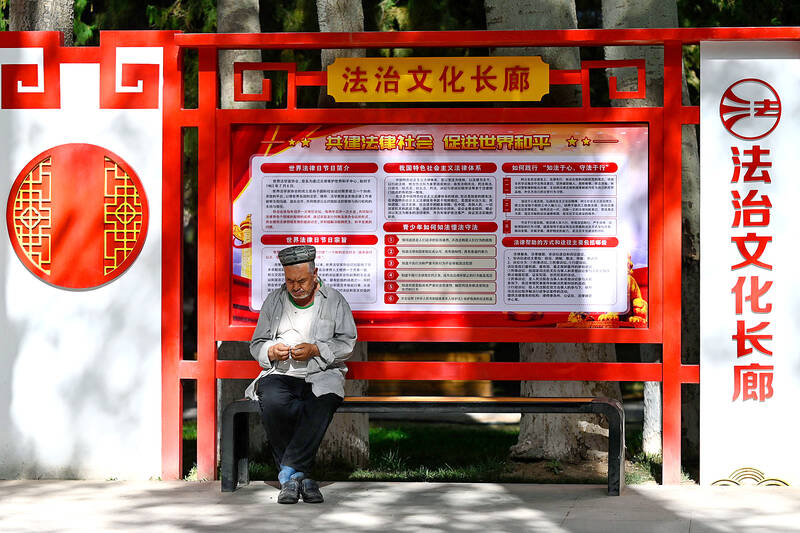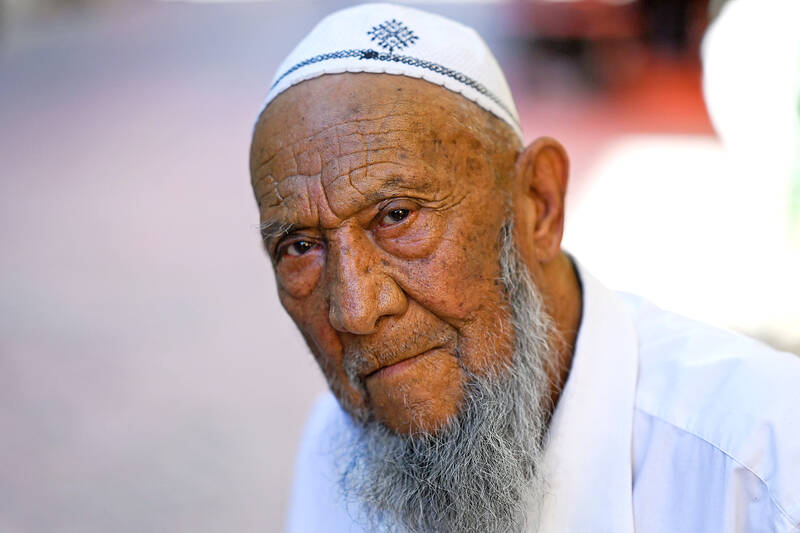Uighur advocates have called on western tourism companies to stop selling package holidays that take visitors through Xinjiang, where human rights abuses by authorities have been called a genocide by some governments.
The request comes as China reopens to foreign visitors after the pandemic, and as its leader, Xi Jinping (習近平), calls for more tourism to the region.
A report by the US-based Uighur Human Rights Project (UHRP), released on Wednesday, said western tourism to the region risked supporting the normalization of Chinese government policies that were “intended to destroy the Uyghur identity.”

Photo: AFP
China’s government has been accused of crimes against humanity and abuses including torture through its policies of mass detention, reeducation, surveillance, population control and oppression of religious and cultural expression in the region. It denies all accusations, saying its policies are aimed at countering extremism and alleviating poverty.
“Nothing under current conditions in East Turkistan aligns with travel company and industry commitments to protection and empowerment of local communities,” the group said, using the traditional name of the region and its title as an independent state between 1944 and 1949.
The UHRP report described tour packages by seven travel companies with offices in western countries. Some were advertising tours available for this year and next, while others had not offered any since before the COVID pandemic, during which China was closed to tourists.

Photo: AFP
Most of the package holidays — often marketed as Silk Road tours — stopped in the Xinjiang cities of Turpan, Kashgar and Urumqi, and some provided “problematic” experiences including visits to the Xinjiang Regional Museum, which UHRP said contributed to the “state erasure of Uighur history, culture and identity,” and the Id Kah mosque, which research groups say has been made largely off limits to Uighurs for prayer.
Some tours, including one by Goway Travel, promised participants would “meet with a local Uighur family.” The UHRP said there was “no possibility” that Uyghur families could freely decline such a visit.
“It is perverse that overseas visitors on organized tours should visit Uighur homes when Uighur families cannot host their own family members who live abroad,” it said. “Further, the presence of family outsiders in Uighur homes has been a key tactic in the surveillance and exploitation of Uighurs,” it added, in reference to a 2017 policy of stationing Han Chinese officials in Uighur homes.
Some tours also offered to visit Aksu, where human rights researchers have identified several detention centers.
The author of the report, Henryk Szadziewski, said: “The optics of advertising and organizing tours to the Uighur region amid ongoing crimes against humanity are disastrous.”
Tourism to troubled regions of the world is subject to debate in the sector and among travelers. Some operators and tourists argue that it remains important to support local communities and to provide observation from the outside.
A spokesperson for Intrepid Travel, a global operation that was among the seven examined by UHRP, said it had “had to confront several ethical considerations in destinations all over the world over its 34-year history. Intrepid believes that travel can be a force for good and can help make a positive impact on the communities we visit.”
The spokesperson said Intrepid worked with about 8,000 suppliers around the world and had dedicated teams to ensure ethical supply-chain management. The company updated its human rights policy in February, mandating a global assessment every three years. The next will take place next year.
Robin Ball, the director of the UK-based company Bamboo Travel, which was also listed by UHRP, said it had sent only a handful of people to Turpan, Urumqi and Kashgar in its 17 years of operation, and none in the past five, but it did offer clients the opportunity to visit the Silk Road region.
He added: “Bamboo Travel does not support the Chinese government in their suppression of the Uighur people, and we would never knowingly provide services that would harm or endanger the local population in China’s Xinjiang province.
“While this report may advocate avoiding all travel to Xinjiang, this is not an approach we would currently consider. We strongly believe engagement with troubled areas, and interaction with people living there, is a better approach than isolation and cutting the revenue streams that tourism provides to locals.”
The UHRP said the travel industry had “laudable” ethical standards and internal accountability mechanisms but tours to Xinjiang failed to meet them. It said its findings were not about how travel companies were run generally but about whether companies conduct the due diligence required to meet the industry standards.
Shortly after the Guardian’s inquiries Intrepid and Goway withdrew tour packages that went through Xinjiang, and the Web pages were removed.
“Goway does not endorse any travel experiences that exploit human rights,” said Craig Canvin, the company’s senior vice-president.
He said the local tour operator Goway had worked with had “assured us of high ethical standards and positive community impact.”
Canvin added: “We recognize that this is a complex issue and after careful deliberation, Goway has made the decision to discontinue the sale of this program while we conduct a rigorous audit.”
The UHRP report comes days after Xi made a surprise stop in Urumqi and delivered a speech that called for an increase in domestic and international tourism to Xinjiang. At the same time he urged officials to “more deeply promote the Sinicisation of Islam and effectively control illegal religious activities.”
Rights groups have found that many of the policies targeting “illegal religious activities” have persecuted people for benign acts of observance, including studying the Koran and having a beard.
The UHRP report said visitors to Xinjiang were seeing only a Uighur identity “permitted by the Chinese state.”
It added: “What the Chinese state has left of public expressions of Uighur identity has remained for commodification and exploitation, not only by visitors on tours from overseas but also domestic tourists.”

We lay transfixed under our blankets as the silhouettes of manta rays temporarily eclipsed the moon above us, and flickers of shadow at our feet revealed smaller fish darting in and out of the shelter of the sunken ship. Unwilling to close our eyes against this magnificent spectacle, we continued to watch, oohing and aahing, until the darkness and the exhaustion of the day’s events finally caught up with us and we fell into a deep slumber. Falling asleep under 1.5 million gallons of seawater in relative comfort was undoubtedly the highlight of the weekend, but the rest of the tour

Youngdoung Tenzin is living history of modern Tibet. The Chinese government on Dec. 22 last year sanctioned him along with 19 other Canadians who were associated with the Canada Tibet Committee and the Uighur Rights Advocacy Project. A former political chair of the Canadian Tibetan Association of Ontario and community outreach manager for the Canada Tibet Committee, he is now a lecturer and researcher in Environmental Chemistry at the University of Toronto. “I was born into a nomadic Tibetan family in Tibet,” he says. “I came to India in 1999, when I was 11. I even met [His Holiness] the 14th the Dalai

Following the rollercoaster ride of 2025, next year is already shaping up to be dramatic. The ongoing constitutional crises and the nine-in-one local elections are already dominating the landscape. The constitutional crises are the ones to lose sleep over. Though much business is still being conducted, crucial items such as next year’s budget, civil servant pensions and the proposed eight-year NT$1.25 trillion (approx US$40 billion) special defense budget are still being contested. There are, however, two glimmers of hope. One is that the legally contested move by five of the eight grand justices on the Constitutional Court’s ad hoc move

Stepping off the busy through-road at Yongan Market Station, lights flashing, horns honking, I turn down a small side street and into the warm embrace of my favorite hole-in-the-wall gem, the Hoi An Banh Mi shop (越南會安麵包), red flags and yellow lanterns waving outside. “Little sister, we were wondering where you’ve been, we haven’t seen you in ages!” the owners call out with a smile. It’s been seven days. The restaurant is run by Huang Jin-chuan (黃錦泉), who is married to a local, and her little sister Eva, who helps out on weekends, having also moved to New Taipei